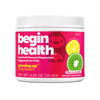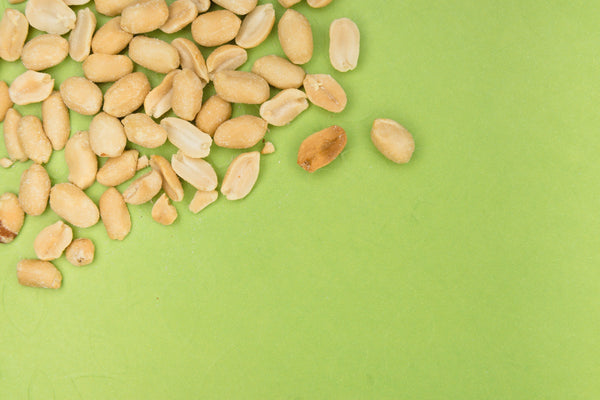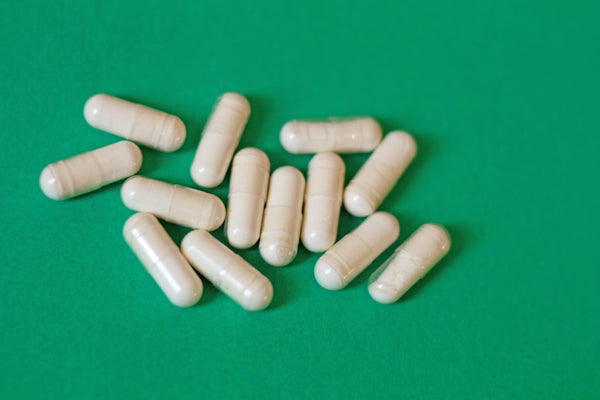Top 10 Magnesium-Rich Foods for Kid’s Gut Health
share this article

Here at Begin Health, we know how essential a healthy gut is for our kid’s overall health. One of the nutrients that plays a vital role in nourishing gut health naturally is magnesium. Magnesium is involved in hundreds of metabolic reactions, including digestion, muscle and nerve function, fluid balance, and nutrient absorption [1]. We love encouraging magnesium-rich foods in addition to using our Growing Up Prebiotics to nourish a flourishing microbiome.
Let’s take a look at the top 10 magnesium-rich foods that can give your kids’ digestive system a boost and promote a healthy gut microbiota.
Spinach
Popeye was onto something with his love for spinach! This leafy green vegetable is not only rich in magnesium but also provides a good dose of insoluble fiber. Insoluble fiber promotes healthy digestion and can help prevent constipation by adding bulk to the stool [2].
Almond Butter
Almonds are a delicious and convenient snack that pack a punch of magnesium. Munching on a handful of almonds or eating it as almond butter can provide a significant amount of this essential mineral. In addition, the healthy fats and fiber found in almonds can also help make us feel fuller for longer by regulating appetites and balancing our blood sugar [3].
Avocado
Creamy, delicious, and nutrient-dense, avocados are not only a trendy superfood but also a great source of magnesium. Avocados contain both soluble and insoluble fiber, which can support a healthy gut by feeding beneficial gut bacteria and promoting regular bowel movements [2].
Black Beans
Black beans are not only a fantastic plant-based protein source but also a magnesium powerhouse. These legumes are also packed with prebiotic fiber, which can aid digestion. Studies have shown that the resistant starch found in black beans acts as a prebiotic fiber that can help contribute to good gut bacteria and promote a healthy gut environment [5].
Salmon
In addition to being an excellent source of omega-3 fatty acids, salmon is rich in magnesium. Omega-3 fatty acids have anti-inflammatory properties, which can help reduce inflammation in the body and support a healthy digestive system [4].
Pumpkin Seeds
Pumpkin seeds may be small, but they are mighty when it comes to nutrition. These seeds are a good source of magnesium and fiber. The fiber aids in regular bowel movements and acts as a prebiotic, which is a beneficial gut bacteria - just like our Growing Up Prebiotics.
Yogurt
Yogurt is a probiotic-rich, high protein food that can contribute to a healthy gut microbiome. While it may not be the highest source of magnesium, it still provides a decent amount of this mineral. Studies have shown positive effects of consuming yogurt on gut microbiota composition among infants and toddlers aged 4 to 24 months. [6] Opt for plain, unsweetened yogurt to avoid added sugars that can disrupt gut health.
Kiwis
Kiwis contain not only magnesium, but fiber as well to support a healthy digestion. Studies have shown that golden kiwis in particular can increase the absorption and retention of key nutrients including iron, calcium, and magnesium [8]. Incorporating kiwis can help our kiddos stay healthy by providing them a variety of vitamins for optimal health.
Prunes
Prunes contain magnesium and are beneficial for constipation due to the fiber content. In addition, studies show that the phenolic compounds found in prunes may have a laxative effect and contribute to an increase in bowel frequency [7]
Leafy Greens
In addition to spinach, other leafy greens like kale, Swiss chard, and collard greens are excellent sources of magnesium. These greens are also rich in vitamins, minerals, and fiber, making them a fantastic addition to a kid’s diet for overall gut health.
Daily reads to help your little ones lead happier and healthier lives.
Join the
Happy Gut Club
How much magnesium is in these foods?
The following chart lists the percent of the recommended daily intake for magnesium that each serving of these foods provides:
|
Food Source and Serving Size |
% RDI for Magnesium (Ages 1-3) |
% RDI for Magnesium (Ages 4-8) |
|---|---|---|
|
Spinach, 1 cup cooked |
196% |
121% |
|
Avocado, 1 medium |
36% |
22% |
|
Almond butter, 2 tbsp |
113% |
69% |
|
Black beans, cooked, 1 cup |
150% |
92% |
|
Salmon, cooked, 3 ounces |
33% |
20% |
|
Pumpkin seeds, ¼ cup raw |
188% |
115% |
|
Plain, low fat yogurt, ¾ cup |
34% |
21% |
|
Kiwi, 1 medium |
21% |
13% |
|
Dried prunes, 5 pieces |
51% |
32% |
|
Leafy Greens, 1 cup raw kale |
10% |
6% |
Key Takeaways
Nourishing your little one’s gut with magnesium-rich foods is a natural way to support digestive health. However, for those picky eaters in our lives, adding in our Growing Up Prebiotics is an easy way to provide additional prebiotic fiber that also supports a kid’s growing microbiome. It’s tasteless, textureless, and can be added to beverages they already love. Incorporate a variety of these foods into your kid’s diet daily to support regular bowel movements.
Remember, a varied and balanced diet that’s rich in prebiotic fiber is key for maintaining optimal gut health. So, start incorporating these magnesium-rich foods today and embark on a journey to healthier poops!
Magnesium is a key nutrient for supporting gut health. Incorporating magnesium-rich foods into our kid’s diets alongside the use of Growing Up Prebiotics or Growing Up Magnesium can help nourish a thriving gut microbiome. Magnesium-rich foods include spinach, kiwis, avocado, and prunes all contain fiber to maintain a healthy gut.
















